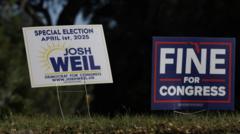With control of the House at stake, both parties are channeling their resources into a key congressional race.
**Florida Midterm Elections: A Pivotal Showdown as Voter Sentiment is Tested**

**Florida Midterm Elections: A Pivotal Showdown as Voter Sentiment is Tested**
A special election in Florida serves as a bellwether for the approaching midterms.
In a charged atmosphere ahead of the midterm elections, Ocala, Florida, has become a focal point for a special election that could signal voter sentiment across the nation. Democratic candidate Josh Weil, a public school math instructor, confidently asserted on Monday that he would overturn a traditionally Republican stronghold and help shift control of the House from the GOP. Addressing supporters in a strip-mall parking lot, he declared, "Their 2025 agenda stops here," criticizing President Donald Trump and billionaire Elon Musk for their push to diminish government services.
Randy Fine, Weil's Republican adversary, echoed a battle cry of escalating urgency during a recent telephone town hall. He warned voters of a Democratic surge poised to obstruct Trump’s agenda. Residents from Ocala to Daytona Beach cast ballots for the congressional seat previously held by Michael Waltz, who was appointed as national security advisor by Trump.
The stakes are particularly high; if Weil manages to win a district that Trump dominated by over 30 points in the last election, it would herald a significant shift in the political landscape and bring the Democrats closer to a majority in the House. In addition to attracting national attention due to its political implications, this race bears witness to the fluctuating motivations of voters as Trump embarks on his second term.
The special election is one of two occurring in Florida on Tuesday, the second unfolding in the state’s Panhandle to replace Matt Gaetz, who withdrew from consideration for a Trump administration role amid scandal. Fine faces a considerable challenge; Weil has amassed around $10 million in campaign contributions compared to Fine’s $1 million haul.
A recent poll suggested a tight race, with Fine barely leading by a margin that makes Republican supporters anxious. Activists like Randy Ross emphasized the need for Republican voters to make their presence felt in the polls, pointing out that high turnout is vital to overcome Democratic enthusiasm. On the other hand, Weil’s robust fundraising efforts and the presence of prominent Democrats could ignite voter energy.
Former President Trump and influential Republican figures have been rallying support for Fine in a bid to bolster his campaign. Fundraising initiatives from powerful allies, including Musk’s recent contributions, indicate the party is keen to restore confidence and prevent a Democratic victory, which would have deeper implications beyond this single district.
As both political factions engage in a campaign to influence the election narrative, observers note the socio-political complexities at play. The potential for a Democratic victory could spur moderate Republicans to reconsider their alignment with Trump's policies. Historically, special elections have presented Democrats an opportunity to gain momentum, as seen in past cycles following individual victories, though Republican failures could similarly dampen Democratic enthusiasm.
With voter engagement critical in shaping the 2024 electoral horizon, both sides recognize the importance of these races in setting the tone for the coming congressional contests, and the outcome in Florida could very well be a harbinger of broader national trends.
Randy Fine, Weil's Republican adversary, echoed a battle cry of escalating urgency during a recent telephone town hall. He warned voters of a Democratic surge poised to obstruct Trump’s agenda. Residents from Ocala to Daytona Beach cast ballots for the congressional seat previously held by Michael Waltz, who was appointed as national security advisor by Trump.
The stakes are particularly high; if Weil manages to win a district that Trump dominated by over 30 points in the last election, it would herald a significant shift in the political landscape and bring the Democrats closer to a majority in the House. In addition to attracting national attention due to its political implications, this race bears witness to the fluctuating motivations of voters as Trump embarks on his second term.
The special election is one of two occurring in Florida on Tuesday, the second unfolding in the state’s Panhandle to replace Matt Gaetz, who withdrew from consideration for a Trump administration role amid scandal. Fine faces a considerable challenge; Weil has amassed around $10 million in campaign contributions compared to Fine’s $1 million haul.
A recent poll suggested a tight race, with Fine barely leading by a margin that makes Republican supporters anxious. Activists like Randy Ross emphasized the need for Republican voters to make their presence felt in the polls, pointing out that high turnout is vital to overcome Democratic enthusiasm. On the other hand, Weil’s robust fundraising efforts and the presence of prominent Democrats could ignite voter energy.
Former President Trump and influential Republican figures have been rallying support for Fine in a bid to bolster his campaign. Fundraising initiatives from powerful allies, including Musk’s recent contributions, indicate the party is keen to restore confidence and prevent a Democratic victory, which would have deeper implications beyond this single district.
As both political factions engage in a campaign to influence the election narrative, observers note the socio-political complexities at play. The potential for a Democratic victory could spur moderate Republicans to reconsider their alignment with Trump's policies. Historically, special elections have presented Democrats an opportunity to gain momentum, as seen in past cycles following individual victories, though Republican failures could similarly dampen Democratic enthusiasm.
With voter engagement critical in shaping the 2024 electoral horizon, both sides recognize the importance of these races in setting the tone for the coming congressional contests, and the outcome in Florida could very well be a harbinger of broader national trends.



















